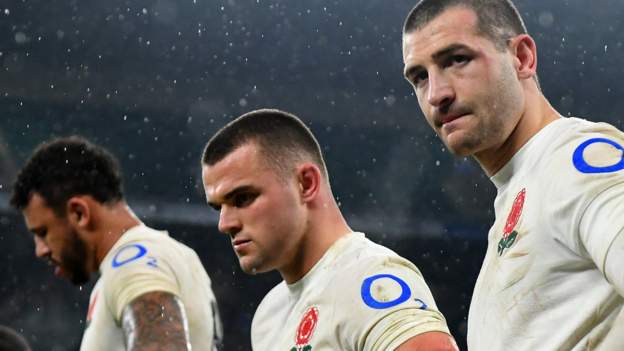
England head coach Eddie Jones has been backed to lead the side through to the World Cup in France in 2023, after the Rugby Football Union conducted a review into the "sub-optimal" Six Nations campaign.
But which of these are valid reasons, and which feel like excuses?
We take a look at the RFU's reasons for England's underwhelming campaign.
Chris Jones: "Jones was no doubt dealt a tough hand in the build-up to the tournament when it came to his coaching team.
"While Craig's role with the England team has never been specified, Ryles is highly-rated and made a big impact in his previous short-term assignments.
"However it was Jones' choice to draft in 28-year-old Ed Robinson from Jersey Reds to replace Ryles on a temporary basis, rather than a top-flight coach with more experience.
"Are relations with the Premiership clubs so disjointed that no coach could be seconded to England for a two-month spell?
"Furthermore, Jones insisted in January his self-isolation had not disrupted preparation in any shape or form, claiming he only missed one day of camp. 'Has it been disruptive? Not one iota,' he said.
Chris Jones: "The match-sharpness of the Saracens players was flagged as a major issue in the build-up to the campaign, with most of them - Billy Vunipola aside - without a game in two months.
"However, Mark McCall and Jones were said to be in constant dialogue to ensure the players hit the ground running in the Six Nations, with both coaches deciding against giving the players any game time in Saracens' January matches.
"The back-to-back Premiership seasons, including midweek matches in August and September, no doubt placed strain on some players, especially without a pre-season to recharge.
"However the season structure was signed off by the RFU in collaboration with Premiership Rugby, while Covid cancellations in December and January meant many players were a lot fresher than expected.
"As for the 'notable players unavailable', injuries are part and parcel of the game - England's pool of players is big enough and good enough to cope with the odd absentee - while Kyle Sinckler's unavailability for the Scotland opener was self-inflicted."
Chris Jones: "This is a fascinating explanation for England's travails at the breakdown and their high penalty count.
"But is it an admission the players are not coached properly, whether at club or international level?
"Either way, for the most experienced England team of all time to be technically and physically deficient appears strange, if not concerning."
Chris Jones: "With Covid cases rising at the turn of the year, England's Six Nations bubble protocols were significantly tighter compared to the Autumn Nations Cup.
"With no mingling in the hotel and all meetings taking place outside, players spoke out about the difficulty of the environment both during and after the Championship, and there is no doubt it had a detrimental impact on performance.
"The saga with France and their virus outbreak served as a reality check and a justification for the RFU's stringent rules. However Jones repeatedly stressed the need for England to be adaptable, while the other home nations also had their own challenges to deal with."
Chris Jones: "While Jones was restricted to a 28-man squad, rather than the usual 32 or 33 or more, he still chose to select what he calls 'project' players like Paolo Odogwu or Harry Randall, rather than an individual more ready for Test rugby.
"Furthermore, his shadow squad was littered with youth, meaning a rookie like teenage flanker George Martin was drafted into matchday squads rather than any number of experienced flankers operating in the Premiership.
"Yes, there was little movement in and out, which prevented the selection of high-quality players like Sam Underhill or Joe Launchbury towards the end of the campaign. But Jones was still able to draft Sinckler in after the Scotland game, and was able to keep Mako Vunipola in camp as he made his comeback from injury.
"Surely he would rather a squad that stayed together throughout the campaign, rather than have a chunk of players constantly returning to play club rugby in fallow weeks, as was the case for Scotland and Wales?"
What happens next?
Among the recommendations, the RFU are seeking "greater alignment" between the England team and the clubs in a bid to find "common ground and goals for the English game moving forward".
Tension between club and country then; it was ever thus.
In 2015, before taking the job, Jones raised the issue of England players being torn between their clubs and country, and six years on this review suggests little has changed.
Part of the "greater alignment" will look to address the "increasing speed of the game", an inference that the Premiership is not preparing England players properly for international rugby.
Yet it was Jones who insisted in the autumn the international game was based on defence and kicking, hence England's conservative tactics at the end of 2020.
If you were a club director of rugby, you would be forgiven for being a bit confused about what the Twickenham hierarchy were after.
Another recommendation of note will see "external rugby experts" - hitherto anonymous - working with Jones after each campaign. Is this an indication he isn't being challenged enough, or is he not being given enough support by the RFU?
Or is it both?
This is just one of the imponderables from a review that will leave England fans with as many questions as answers.















 Phone: (800) 737. 6040
Phone: (800) 737. 6040 Fax: (800) 825 5558
Fax: (800) 825 5558 Website:
Website:  Email:
Email: 






